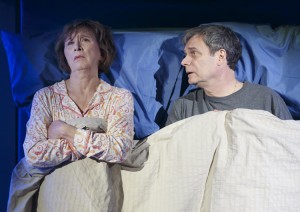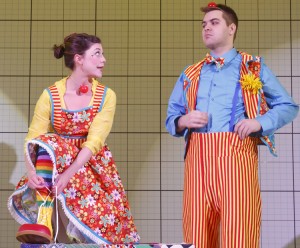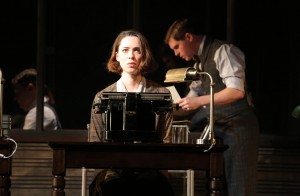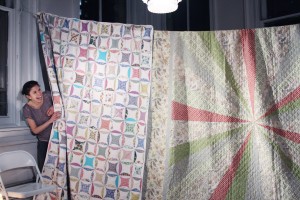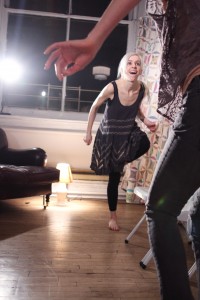Sarah Ruhl’s new play, Stage Kiss, examines the rekindling of a romance between a scattered actress and a struggling actor as they discover they have been cast as lovers 10 years after their break-up and estrangement. Foolish, egotistical thespians and their hangers-on have long provided comic fodder for the stage: George Kelly’s The Torch-Bearers (1923); George S. Kaufman and Edna Ferber’s The Royal Family (1928); So Help Me God!—a 1929 play by Maureen Dallas Watkins that was unearthed by the Mint Theater in 2009; the madcap Room Service (1937); Noel Coward’s Present Laughter (1942); Moss Hart’s Light Up the Sky (1948); Michael Frayn’s 1982 farce Noises Off; and, of course, Mel Brooks’s The Producers (2001).
Sarah Ruhl’s attempt to follow in those footsteps is stutteringly amusing but mostly tiresome. To be sure, the piece suggests that she is after something closer to the heftier entries (more Royal Family than Room Service), but Ruhl has significantly not given her main characters real names. They are She, He, The Director and The Husband, and they come off as ciphers more than flesh-and-blood people. Other hurdles include the disruption of comic momentum by songs in Brechtian fashion (including “Some Enchanted Evening”) and an interlocking monologue.
The show that the actors are appearing in is, crucially, an old musical. “It was a flop on Broadway in 1932,” says The Director (a nebbishy Patrick Kerr), “but we think with the proper cast, a new score, and some judicious cuts it will be really very well received in New Haven.” That’s a terrific line, but the arch dialogue and melodramatic situations of the revised book that are presented make it inconceivable that any sane producer would back the show. And The Director in rehearsal is earnestly incompetent; he would never have earned a reputation that would put a major musical in his hands.
This all undermines the essential grounding the comedy needs. No matter now farcical events become, there must be a kernel of truth, a modicum of believability. Director Rebecca Taichman has not imposed a singular tone or sharpened Ruhl’s intentions, and the lack of credibility and cohesion may be one reason the performers seem to flounder. Dominic Fumusa and Jessica Hecht as He and She have little chemistry and sometimes seem at sea in their parts.
The splendid first scene, as She arrives late for her audition, promises far more than the remainder delivers. She hasn’t read her “sides,” she asks for an explanation of the plot, and her photo résumé seems to have been trampled in a buffalo stampede. The Director asks her to read with the unprepossessing Kevin (Michael Cyril Creighton), the leading man’s gay understudy. She gets the job. When She discovers that her ex-lover has the role, one might expect comic fireworks on the order of Private Lives, but the results are sporadic cherry bombs and a drifting, angst-ridden affair.
It seems Ruhl’s intention to contrast stage passion with real passion, the heightened romance and physicality of love with the routineness of marriage and workaday life. (“Love me just shy of forever, or love me till six o’clock” goes a song about the gossamer nature of it all.) The significance of a kiss is parsed by He, who takes the position that an audience only tolerates kissing “because it signifies resolution which people like to see on stage but they don’t really like to see the act of kissing on stage, only the idea of kissing on stage. That’s why actors have to be good-looking because it’s about an idea, an idea of beauty completing itself.” (How ironic that critic John Simon was often assailed because he held actors’ looks against them for a similar reason: good looks are a way for an audience to summon quick sympathy for a character in a play’s short span.)
A variety of kisses appear in Stage Kiss, by far the funniest being those of Creighton’s roly-poly substitution for He. The talented actor particularly enlivens a scene on a divan when he opens his mouth wide as if to devour She just before he kisses her (“like a placoderm,” She complains) and frightens her. His nimble physical presence is a choice asset in a comedy that promises much, but delivers little.
Sarah Ruhl's Stage Kiss plays through March 23. Evening performances are at 7 p.m. Tuesday and Wednesday; 8 p.m. Thursday through Saturday; and 7:30 p.m. on Sunday. Matinees are Saturday and Sunday at 2:30 p.m. Ticket prices start at $75 and are available by going to www.playwrightshorizons.org or calling Ticket Central at (212) 279-4200.















